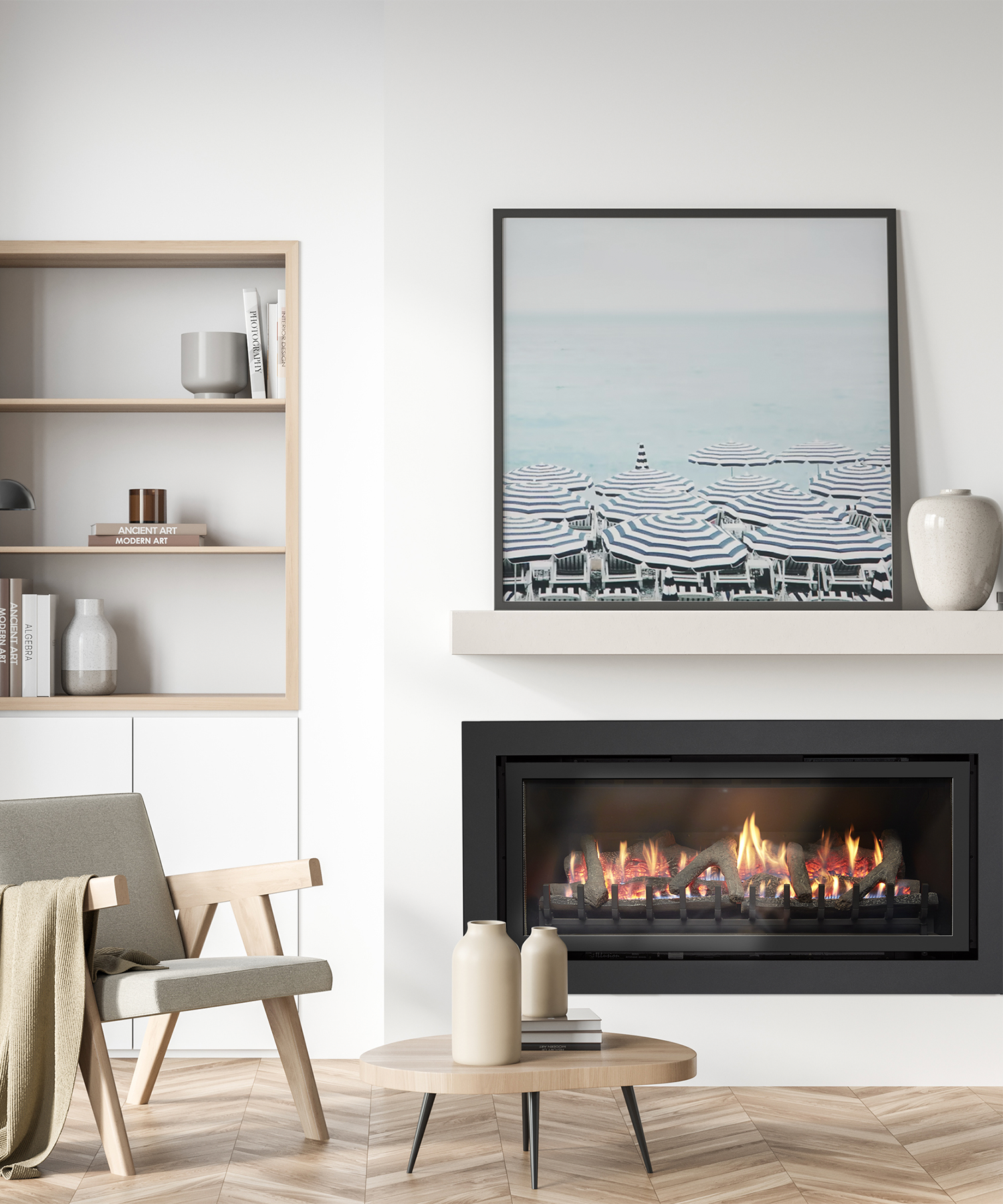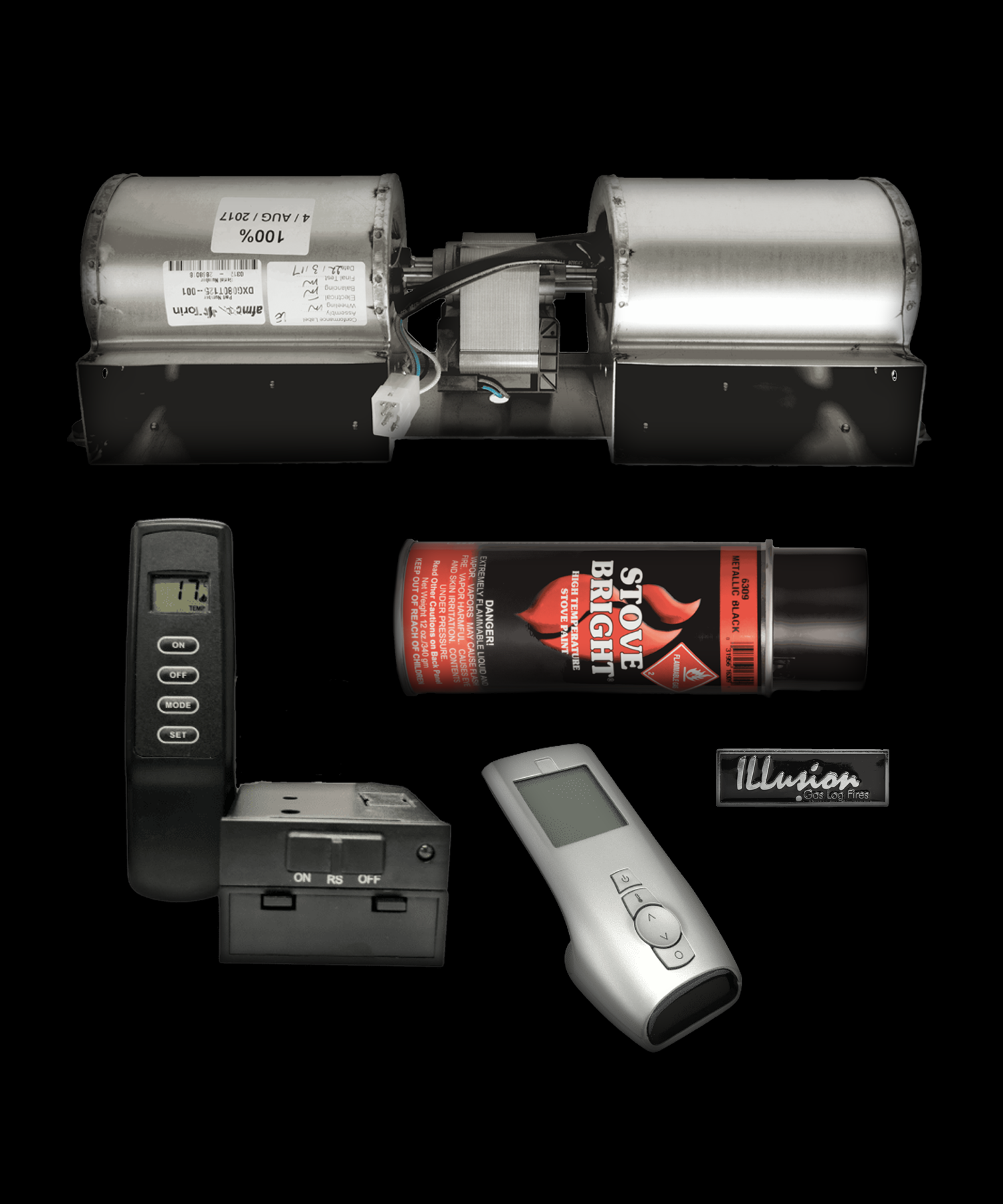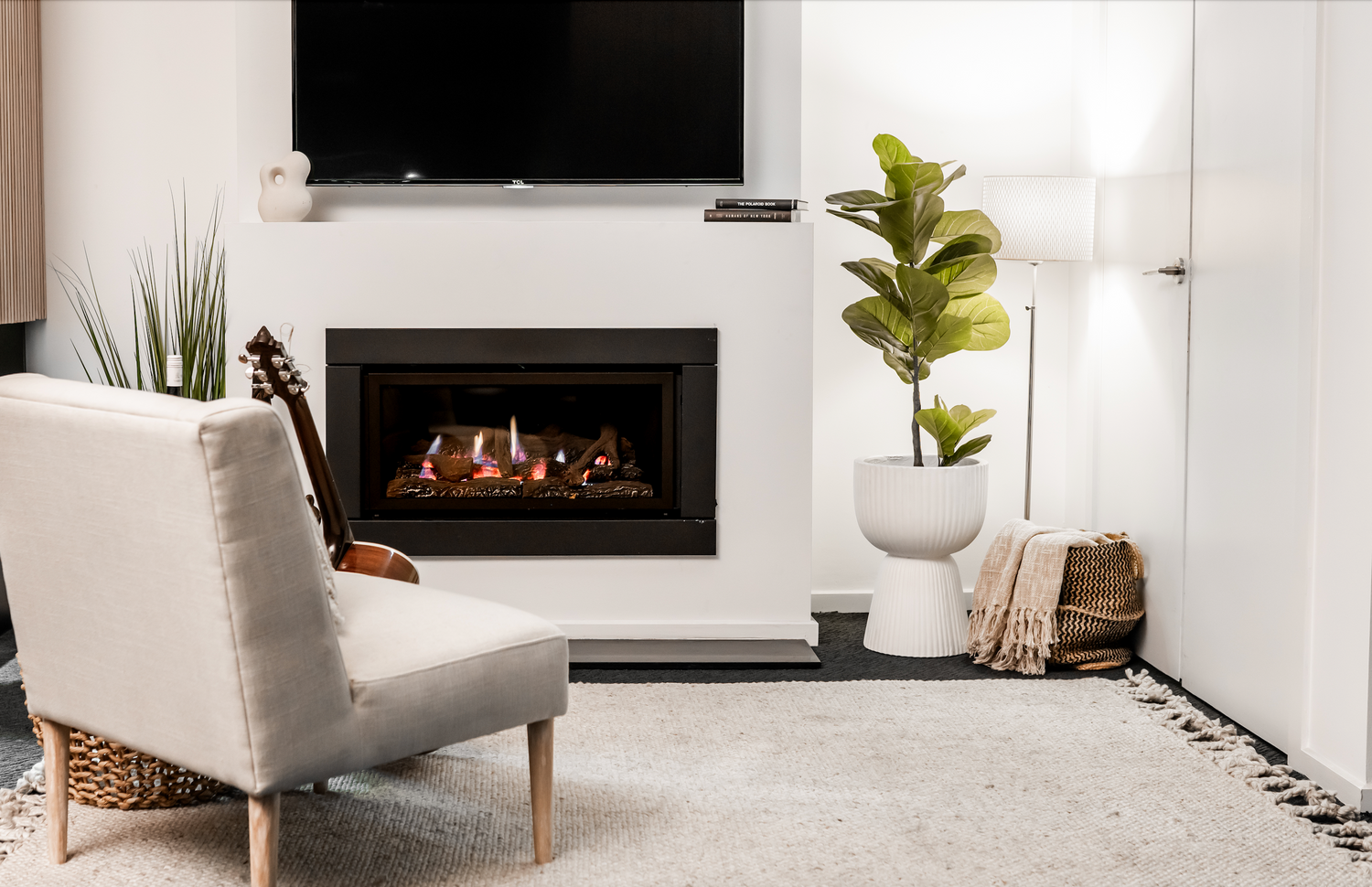Fireplaces bring warmth into your home and turns it into a cozy haven. If you're considering investing in a new fireplace, you may be wondering what kind to pick. Should you get an electric fireplace, a gas log fireplace or even a wood fireplace?
Gas fireplaces are also more aesthetically appealing and can efficiently heat large spaces as well. If you're on a budget, then the electric fireplace may suit you more. Keep in mind though that electric fireplaces aren't as efficient in heating large spaces.
This guide takes you through the differences between these two kinds of fireplaces. It will help you decide whether an electric or gas fireplace will suit your home better.
How Are Gas And Electric Fireplaces Different From Each Other?
The basic structural requirements are the same for both electric and gas log fireplaces. Note that both electric and gas fireplaces are different from wood-burning fireplaces. You don't need to have a chimney to have either of these kinds of fireplaces installed. If you opt for a gas log fireplace, you will need to ensure that there's proper ventilation. Let's look at each of these fireplaces individually.
What Are Gas Log Fireplaces?
A gas log fireplace utilises gas, usually either propane gas or natural gas, as fuel instead of wood. Gas is more efficient than wood in heating up interior spaces quickly. There are multiple kinds of gas log fireplaces that you can come across. These are some of the common varieties of gas fireplaces that you can consider getting:
- A freestanding fireplace that can be installed into almost any room as long as it can be ventilated through a flue.
- Inbuilt gas log fireplace, which can help turn a wood-burning fireplace into a gas log fireplace. Here, the gas insert is built into the existing fireplace, or a purpose-built cavity can be built to house the fireplace.
Gas fireplaces are generally more effective than electric fireplaces at warming up the space. It's also faster and over the long run, can be the cheaper option.
What Are Electric Fireplaces?
Like the name suggests, electricity is used to power the heating element, in these types of fireplaces. Some electric fireplaces can come with a bright LED display, or a display of fake logs burning. Electric fireplaces work by first drawing cool air inside and then heating it using the heating coil present inside. Then, a fan is used to scatter the warm air into your rooms.
Electric fireplaces can easily be installed by you yourself and professional help isn't usually necessary. There are electric fireplaces that can be plugged into wall outlets as well. These are the simplest to install and use. Should you want the electric fireplace wired into the electrical network of your home, then you will need to call an electrician.

Which Should You Opt For?
For both options, you'll usually get a good life span. You also won't need a chimney or a firebox to get most kinds of electrical and gas fireplaces. If you do have a firebox and a chimney, then you can transform your wood-burning fireplace into a gas log fireplace.
With a gas fireplace, you'll be able to heat your interior spaces faster. Gas log fireplaces especially make use of real flames that help heat the surroundings faster and for longer.
The Pros And Cons Of Gas And Electric Fireplaces
Depending on what your needs are and what your budget is, you may choose either an electric fireplace or a gas log fireplace. Here are the pros and cons of both, to help you decide which is better for you.
Cost
Gas fireplaces are more expensive than electric fireplaces to install. You could pay upwards of $3999 for a good gas fireplace, including initial set-up costs. In comparison, electric fireplaces are a lot cheaper and even premium models come below $3000.
It's also more expensive to run gas fireplaces on an annual basis, compared to electric fireplaces. However, you will find yourself needing to replace its light bulbs from time to time. If you use the fireplace more, then the light bulbs will need to be changed more frequently. In comparison, gas log fireplaces last for up to twenty five years. Other than yearly maintenance and running costs, you won't have to worry about needing more money for repairs.
Efficiency In Heating
Gas fireplaces are more effective than electric fireplaces, when it comes to heating interior spaces. If you have a small home or only want to heat a small area, then an electric fireplace could suit you. But if you have a large home, then it's the gas log fireplace that will be able to efficiently heat your interiors.
Gas is capable of producing more heat than electrical elements can produce. This allows gas fireplaces to heat interiors better than electric fireplaces, within the same period of time. For gas fireplaces, you can feel the heat even if you're in another room from the fireplace in your home. For electric fireplaces, you'll actually need to be close to the fireplace to feel the heat.
Aesthetics
Gas log fireplaces allows you to enjoy the look and the feel of real flames heating up your home. This is closer to what a traditional wood burning fireplace might do for you. With an electric fireplace, you'll often get only an LED display. There are no real flames involved in heating your interiors.
Generally, it's the gas log fireplaces that are considered more aesthetically pleasing.
Running Costs
It can be more expensive to opt for a gas log fireplace, as they need yearly maintenance. They also need to be inspected every year to ensure safety standards are met. Compared to this, you'll probably be spending half as much in running and maintaining an electric fireplace.
Note that you may need to run your electric fireplace for longer to heat your interiors. If this happens your energy bills will be higher and your running costs will be more.
What Do You Need To Operate Gas And Electric Fireplaces
Older homes tend to have traditional fireplaces but the newer properties are generally fitted with a gas or an electric fireplace. Gas and electric fireplaces are easier to install, simpler to maintain and better at heating interiors.
There are homeowners who even convert their traditional wood burning fireplaces into gas log fireplaces. But what exactly do you need if you want to install a gas or an electric fireplace in your home?
What Do You Need For Gas Fireplaces?
If you want to have a gas fireplace installed in your home, then you'll need a propane supply or a gas line. These kinds of fireplaces are more efficient than wood burning fireplaces. They also heat interiors faster than electric fireplaces can. To have a gas log fireplace installed in your home, you'll need to have access to a gas line or a supply of propane.
Your gas fireplace can be vented, insert or ventless. The most budget friendly option of these, is the vented option. Ventless gas fireplaces are good at heating interiors as well, but they aren't good for people who have asthma or other respiratory problems. It can trigger allergies in some people as well. You can also opt for the fireplace inserts using natural gas. These are available in various styles and come with advanced features. You can get remote controls and thermostats for these models as well.
If you do find yourself needing a gas line installed, let the professionals handle it.
What Do You Need For Electric Fireplaces?
If you live in a small home or an apartment, then an electric fireplace can be all you need to heat your home. These are a decorative and cost effective way to heat your interiors using electricity. Electrical fireplaces are available in various styles and can be added to your home in various ways. You can choose to have your fireplace mounted on the wall, built into your furniture, or recessed within your wall.
Electric fireplaces don't use actual fire to heat the room. But it could come with a display of logs burning or real flames. You'll also get access to a variety of features with as thermostat controls, heat settings as well as a remote control.
In order to use your electric fireplace, all you need is a standard outlet in your home. For some homeowners, all you'll need to do is plug your electric fireplace into your home. But for other homeowners, you may need to have an outlet specially installed for your electric fireplace. Some homeowners chose to have mantels installed for their electric fireplaces. They also get their electric fireplaces wired into their electrical system.
Why Gas Fireplaces Are More Convenient Than Electric Fireplaces
When asked which kind of fireplace they prefer, homeowners have said that gas log fireplaces tend to be better since they come with real flames. Gas fireplaces are indeed made to look like real fireplaces, and even come with flames as well. Electric fireplaces on the other hand tend to be more artificial in appearance.
Even if electric fireplaces mimic the look and sound of a real fireplace, it doesn't have the same effect as gas log fireplaces. If you live in a place where the climate is colder, then a gas fireplace can be far more useful for you.
More Heat Production
Gas log fireplaces produce more heat than electric fireplaces. They are also more energy efficient and utilize clean burning to convert energy to heat. Electric fireplaces, although not as effective at heating up your interiors, are efficient when it comes to energy conversion.
In gas fireplaces, natural gas is burnt in order to create a flame, requiring more energy. This means that electric fireplaces are more energy efficient. However, it is the gas log fireplaces that are more capable of heating your interiors, even if they use more energy to release heat.
Maintaining Your Fireplace
If you opt for a gas fireplace, then you'll have less daily cleaning work to contend with, compared to wood burning fireplaces. Electric fireplaces require even less maintenance, but you could find yourself needing to replace parts from time to time. This is rare with gas log fireplaces.
Gas fireplaces need to undergo safety and maintenance tests and inspections. This should be done by a fireplace technician certified to do the job. You should ask the technician to check and see if there are any gas leaks. The gas fireplace will also need to be properly cleaned, as everything from dust and pet hair can accumulate around it. This might sound like a lot of work, but it's actually super useful. The fireplace technician helps ensure that your gas fireplace works efficiently for another year.
Electric fireplaces require little maintenance, but you should get the wiring checked and ensure that the light bulbs are working. Gas fireplaces don't require as many repairs and are more durable than their electric counterparts.
Safety At Home
Generally, it's the electric fireplaces that are safer for use. Note that both electric and gas fireplaces produce heat and they should be seen as potential risks for fire. Even if you get a gas fireplace, there are some safety checks that you can put in place to ensure that your home stays safe and warm.
Keep flammable items away from the fireplace and ensure that your children or pets don't get too close to the gas fireplace. Ensure that your home has proper ventilation so that the airflow around the fireplace's vent isn't obstructed. You should also have a carbon monoxide detector installed in your home. With these, the risk factors are largely controlled, making your gas fireplace safe for use. Electric fireplaces are safer to use, but they aren't as efficient at heating large spaces and may need to be left on longer to heat your interiors properly.
Conclusion
There are several pros and cons associated with installing gas log fireplaces as well as electrical fireplaces in your home. Of these, it's the gas log fireplace that's more efficient at heating your home and keeping your family comfortable, oh and don’t forget the ambience. If you're wondering where you can learn more about gas fireplaces or even bring one home, then click here.








Leave a comment
This site is protected by hCaptcha and the hCaptcha Privacy Policy and Terms of Service apply.